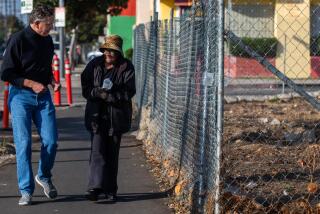Occidental Seeks a Compromise in Palisades Drilling
- Share via
The prospect of an underground pipeline snaking its way along the coastline and up the lush canyons of Pacific Palisades, carrying oil and gas past beaches, schools and hundreds of homes, has refueled the long-running fight against Occidental Petroleum Corp.’s controversial drilling project.
A judge’s ruling on the pipeline issue has put the oil company on the defensive and ignited a burst of new energy on the part of Occidental’s foes, who have been busy scheduling a series of fund-raising events featuring a bevy of sympathetic celebrities, including actors James Garner, Jeff Bridges and Ted Danson.
“There is no way we can lose in court as long as we don’t run out of money (to pay legal fees),” said Robert Sulnick, a Pacific Palisades resident and president of No Oil Inc., the local group that is suing Occidental to stop the drilling project. No Oil argues that the project, and especially the pipeline, raises too great a risk of fires, spills and landslides.
Occidental, meanwhile, has proposed a compromise resolution of the lawsuit that would preserve a portion of the victory it achieved last January when Mayor Tom Bradley and the Los Angeles City Council enacted a set of ordinances authorizing the drilling project.
Jeopardized by Ruling
That victory has been in jeopardy since September when Los Angeles Superior Court Judge Norman Epstein, responding to No Oil’s lawsuit, ruled that Occidental’s environmental impact report on the project did not include enough information about planned construction of a pipeline that would carry the oil and gas from the beachfront drill site to inland refineries.
Epstein is expected to make a final ruling in the case next month.
No Oil has asked the judge to invalidate the drilling ordinances since they were based on an environmental impact report found to be partially defective. That would throw the issue back into the laps of the City Council and Bradley during an election year when the mayor’s record on environmental issues is likely to be a key factor in his race for governor.
Bradley, a Democrat, is expected to run against Republican Gov. George Deukmejian.
Under Occidental’s compromise proposal, the company would lose the right to produce oil and gas but retain the right to drill exploratory wells. The compromise would involve only partial nullification of the drilling ordinances.
Occidental’s lawyers say that the exploratory wells will tell the company what it needs to know about the composition of the oil and gas in order to determine which refinery to use. Since the decision on a refinery will dictate the pipeline route, Occidental argues that exploratory wells are necessary before an adequate environmental report on the pipeline can be drawn.
Right to Explore
“What we are saying is, don’t throw the baby out with the bathwater. Preserve Oxy’s right to do the exploratory work,” said Maria Hummer, a lawyer representing Occidental.
No Oil opposes the compromise because it suspects that once Occidental has begun drilling wells, the project would have gained a momentum that would be difficult to stop.
But even partial nullification of the drilling ordinances would throw the company back on the mercy of city officials. Occidental, once it had revised its environmental report, would have to reapply to the the council and the mayor for permission to build the pipeline and begin producing the wells.
And even with a carefully drawn report, Occidental could not be sure of continued backing from a council that has lost two members who were Occidental supporters during the last year. One of them, Arthur K. Snyder, has not yet been replaced. But the other, Peggy Stevenson, lost her seat to a challenger, Michael Woo, who made opposition to the oil company a centerpiece of his campaign.
Least Acceptable
If Occidental is forced to submit to another vote by the council and the mayor, it would mark the fourth time the company has sought access to oil and gas deposits it has been trying to tap for 20 years.
Hummer, Occidental’s lawyer, emphasized that the oil company views its proposed compromise as the least acceptable of several recommendations contained in a brief submitted to Epstein late last month.
For example, Hummer said, the judge could keep the drilling ordinances intact but order Occidental to prepare a supplementary environmental report on pipeline construction.
In that instance, the issue would not revert to the City Council and would be subject to review only by the Board of Transportation Commissioners, which must approve all pipelines built in the city. Members of the board are appointed by the mayor.
Residents of Pacific Palisades are no strangers to the perils of pipelines.
In 1970, an oil pipeline near Paul Revere Junior High School ruptured while classes were in session and more than 2,000 students were on campus. No one was injured, but the school grounds were inundated with thousands of gallons of escaping oil.
Occidental has indicated that it wants to use one of four proposed pipeline routes, ranging in length from four to nearly eight miles. Two of those routes would pass by Paul Revere Junior High School. Three would go by Canyon Elementary School, and one would pass near Palisades High School.
Beginning at the drill site next to Will Rogers State Beach, three of the routes would follow the Pacific Coast Highway south to Entrada Drive, where they would turn inland before branching off along San Vicente Boulevard, San Lorenzo Drive or Sunset Boulevard. The fourth route would follow the Pacific Coast Highway north to Temescal Canyon Road and from there to Sunset Boulevard.
Would Carry Oil, Gas
The pipeline would carry oil and gas, lead to existing trunk lines and ultimately to refineries.
Occidental officials say the selection of the route depends on which refineries will be used and where the refineries’ trunk lines are located. No decision on refineries can be made, the officials say, until exploratory wells are drilled and more is learned about the nature of the oil and gas.
A risk analysis firm, hired by No Oil, analyzed Occidental’s four proposed pipeline routes and, in a report given to Judge Epstein, predicted “. . . a major pipeline accident from either the oil or gas line . . . about once every 25 years.”
The firm, NDE Technology Inc. of Los Angeles, based its prediction on accident records of existing pipelines and on information from Occidental showing that, along all four routes, the pipelines would pass close to an earthquake fault and run uphill from the drill site, requiring “high operating pressure.”
In their recent brief, Occidental’s lawyers do not take issue with the NDE report except to argue that the proposed pipeline should not be regarded as any different from other pipelines.
25,000 Accidents
“Such pipelines have served this city--and the nation’s ever-growing petroleum needs--for 40 years or more,” the brief states.
There are 1.1 million miles of underground oil and gas pipelines in the country with at least 6,500 miles under Los Angeles.
Between 1968 and 1982, there were about 25,000 pipeline accidents across the country, according to the most recent study prepared by the U.S. Department of Transportation’s pipeline safety division.
According to the study, the accidents caused 359 deaths and 3,630 injuries.
In Los Angeles, there has been at least one serious pipeline accident during the last 10 years. In 1976, a ruptured gasoline line exploded in Culver City, killing eight people and destroying several buildings.
State and federal officials in charge of regulating pipelines say the majority of breaks are caused by excavation crews unaware that they are digging near pipelines.
Occidental’s lawyers said they hope to convince Epstein that the oil company can take steps to ensure the protection of their lines.
They take heart from Epstein’s findings that, aside from the pipeline, Occidental already has shown that it can virtually eliminate environmental risks posed by the drilling project.
For example, Epstein rejected No Oil’s claim that Occidental would not be able to stabilize a slide-prone hillside overlooking the drill site.
But no matter how Epstein finally rules, the fate of the drilling project is not likely to be decided for a long time.
Even if Epstein does not require Occidental to go back before the City Council, city officials estimate that it would take from 18 months to three years to prepare a supplemental environmental impact report.
Occidental also must obtain permits to drill on the coast from both the city’s Board of Zoning Adjustment and the California Coastal Commission.
Moreover, No Oil spokesmen have said that, regardless of how Epstein rules, they plan to appeal the judge’s pro-Occidental findings.
Above all, said Robert Sulnick, his group will appeal the argument, rejected by Epstein, that oil drilling is an industrial use prohibited in Pacific Palisades by the city’s planning restrictions for that area.
“Oil is the symbol of the industrial revolution,” Sulnick said. “If it isn’t an industrial use, I don’t know what is.”
More to Read
Sign up for Essential California
The most important California stories and recommendations in your inbox every morning.
You may occasionally receive promotional content from the Los Angeles Times.










